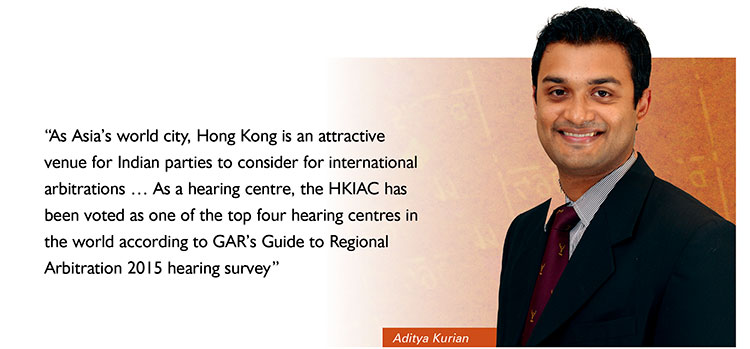Speaking specifically to Indian parties, Aditya Kurian of the Hong Kong International Arbitration Centre, goes into detail about why the Global Arbitration Review was recently quoted saying “Regional arbitration pretty much began with the HKIAC. No regional institution has been running for so long. Or with such success” and why the World Economic Forum 2014 ranked Hong Kong fifth worldwide and first in Asia for judicial independence.
Indian parties have much to gain from Hong Kong’s position as Asia’s pre-eminent arbitral seat and from the HKIAC as the oldest international arbitral institution in Asia. The HKIAC was founded in 1985 and according to the Global Arbitration Review (GAR) “Regional arbitration pretty much began with the HKIAC. No regional institution has been running for so long. Or with such success”. The year 2015 is a milestone for HKIAC as it will be celebrating its 30th anniversary. For Indian parties looking for a mature arbitral jurisdiction with an international arbitral institution that is well established and of international repute, they can look no further than Hong Kong and the HKIAC. The latter administers arbitrations, mediations and domain name disputes, making it a one-stop shop for dispute resolution in Asia.
Hong Kong
As Asia’s world city, Hong Kong is an attractive venue for Indian parties to consider for international arbitrations. Hong Kong offers Indian nationals a 14 day visa on arrival and this has compelled Indian parties to choose the HKIAC as a venue for their hearings. As a hearing centre, the HKIAC has been voted as one of the top four hearing centres in the world according to GAR’s Guide to Regional Arbitration 2015 hearing survey. The convenience of flying to Hong Kong for a two week period without the hassle of applying for a visa gives Hong Kong a significant comparative advantage to other arbitral venues around the world. The flying time to Hong Kong from most of the key Indian cities ranges from just four to six hours with direct flights on a daily basis. Added to the excellent connectivity is a very convenient time zone difference, with Hong Kong being just two and a half hours ahead of India. This allows for seamless coordination between the two time zones for Indian parties.
Where enforceability of awards is concerned, Hong Kong is a party to the Convention on the Recognition and Enforceability of Foreign Awards and is notified by the government of India in its official gazette. As a result of the gazettal, arbitral awards rendered in Hong Kong are recognised and enforced in Indian courts. Hong Kong’s neutrality is one of the reasons why it has become a preferred destination for international arbitration. Although a part of China, under the one country two systems model, Hong Kong has an independent judiciary that follows a pro-arbitration approach. It has non-permanent judges from the commonwealth (i.e. UK, Australia and Canada) that sit on the Hong Kong Court of Final Appeal. The World Economic Forum’s 2014 judicial ranking placed Hong Kong fifth worldwide and first in Asia for judicial independence. In addition to the appeal of its independent and pro arbitration judiciary, Indian parties can take comfort in the similarity between the legal systems of India and Hong Kong given that they are both common law jurisdictions. The arbitration laws of India and Hong Kong are also similar as they are both based on the UNCITRAL Model Law on International Commercial Arbitration (Model Law). Hong Kong was the first Asian country to adopt the Model Law and is the only country in Asia that has based its arbitration legislation on the latest version of the Model Law.
Indian parties concerned about the confidentiality of arbitrations will find it attractive that under Hong Kong arbitration law, confidentiality applies to even arbitration related court proceedings.
Ad hoc arbitration
Although arbitration in India is slowly moving towards institutional arbitration, ad hoc arbitration still dominates the Indian arbitration landscape. Where ad hoc arbitrations are seated in India, the Indian Arbitration and Conciliation Act 1996 (Act) applies as the procedural law applicable to the seat. In these arbitrations, if a party fails to appoint an arbitrator, under the Act, an application has to be made to the Chief Justice of the High Court or the Supreme Court of India, where appropriate, to appoint the arbitrator. The time taken by the court in making the appointment can vary and in many cases can exceed six to seven months. This can make the process costly and time consuming. It defeats the purpose of choosing arbitration as a mechanism to bypass courts and to save time and cost. Further, if the arbitral clause in an ad hoc arbitration seated in India is silent on the number of arbitrators and if the parties have failed to agree on the number, the Act prescribes one arbitrator as the default number. Where the sum in dispute is a very large and complex one, the default number of one arbitrator can be counterproductive to efficiency. These are some of the problems that have plagued ad hoc arbitrations seated in India.
 Hong Kong, on the other hand, offers a robust arbitral system that is more closely aligned with user expectations. Indian parties wanting to steer clear from the problems plaguing ad hoc arbitrations in India should consider Hong Kong to seat their arbitrations. By doing so, they can avail of cost-effective and practical solutions where arbitrator appointment and decision on number of arbitrators is concerned. By seating ad hoc arbitrations in Hong Kong, parties can take advantage of the HKIAC as the default appointing authority under the Hong Kong Arbitration Ordinance. This means that if one party fails to appoint an arbitrator, the HKIAC will appoint the arbitrator on behalf of the default party. The appointment process usually takes less than two weeks. HKIAC charges a reasonable appointment fee of HK$8,000.00 (approx. INR 56,000) for providing the service. As the default appointing authority, the HKIAC is empowered to decide on the number of arbitrators if the arbitration agreement is silent on the number. A party can apply to the HKIAC for a decision on the number of arbitrators. When deciding such an application, the HKIAC will look at factors such as value of the dispute and complexity before deciding on the appropriate number of arbitrators i.e. either one or three. Similar to the appointment fee, the HKIAC charges HK$8,000.00 (approx. INR 56,000) for a decision on the number of arbitrators.Institutional arbitration If an Indian party chooses to opt for institutional arbitration, the HKIAC and Hong Kong offers numerous benefits to support the process. The HKIAC offers Indian parties the choice of two sets of rules to administer arbitrations i.e. the 2013 HKIAC Administered Arbitration Rules (Rules) and the Procedures for the Administration of Arbitration under the UNCITRAL Arbitration rules (2015) (Procedures). Indian parties that are more comfortable with the UNCITRAL arbitration rules can opt to have their arbitration administered by the HKIAC under the Procedures. The Rules, on the other hand reflect the very best of modern practices in international arbitration. In recognition of its innovative features, the GAR has nominated the Rules to be one of the best developments of 2013. Under the Rules, Indian parties can avail of the emergency arbitrator procedure. This means that if an Indian party is in need of emergency relief prior to the constitution of the arbitral tribunal, it can file an emergency application to the HKIAC for the appointment of an emergency arbitrator. The HKIAC would appoint the emergency arbitrator within two days of accepting the application. The emergency arbitrator would render his decision on the application to the parties within 15 days of the date on which he receives the file. The award or order rendered by the emergency arbitrator is enforceable in Hong Kong. The emergency arbitrator provision can be useful for Indian parties seeking urgent relief before the constitution of the arbitral tribunal to prevent the occurrence of any destruction, dissipation or degrading of assets. |
 Indian parties seeking to fast track their arbitrations can avail of the provision on expedited procedure under the Rules. This procedure applies where: the amount in dispute does not exceed HK$25,000,000 (approx. INR 204,512,183); if the parties agree; or if the matter is of exceptional urgency. If the expedited procedure applies, the time limits to constitute the tribunal may be shortened, a sole arbitrator would normally be appointed to decide the dispute on the basis of documentary evidence only and the arbitral tribunal has to render its award within six months of the date on which the HKIAC transmitted the file to the arbitrator.For complex arbitrations involving multiple contracts, transactions and parties, Indian parties can take advantage of the provisions under the Rules on joinder, consolidation and single arbitration under multiple contracts. Under the joinder provision, an additional party can be joined if prima facie the additional party is bound by the arbitration agreement giving rise to the arbitration. A request for joinder can be decided by the HKIAC if received before the arbitral tribunal is constituted. If received after constitution, the arbitral tribunal will decide on the request. For Indian parties looking to avoid multiple related proceedings, the provision on consolidation under the Rules will enable them to consolidate multiple disputes into a single arbitration provided certain criteria are satisfied. Similar to the provision on consolidation, an Indian party with claims arising out of multiple contracts from a series of related transactions can commence a single arbitration subject to the satisfaction of certain criteria. From a cost, time and efficiency perspective, Indian parties will find these provisions highly beneficial to the arbitral process. A unique and innovative feature under the Rules that allows parties to control the costs of the arbitral tribunal is a twin-track fee regime and standard terms and conditions that apply to the appointment of all arbitrators under the Rules. The twin-track fee regime gives parties the choice to either remunerate the arbitral tribunal on an hourly basis or based on the amount in dispute. Indian parties will find that the choice of these two options will help them evaluate costs based on the nature of the claims. The parties can choose the hourly basis option to remunerate the arbitral tribunal if they consider the dispute to be a high value but straight forward one. If the parties consider that the case would be very time consuming because of the highly complex nature of the dispute, they could choose to control costs of the arbitral tribunal by opting for the ad valorem method. In addition to the twin-track fee regime are the standard terms and conditions that remove awkward negotiations between the parties and the arbitrators on fees and terms and conditions that the parties might consider onerous. The standard terms and conditions help expedite the appointment process and simplify the terms of appointment of an arbitrator. In deciding the seat, venue or choice of an institution, Indian parties will find that there is much to be gained from Hong Kong and the HKIAC for an efficient and cost effective dispute resolution process. |




















